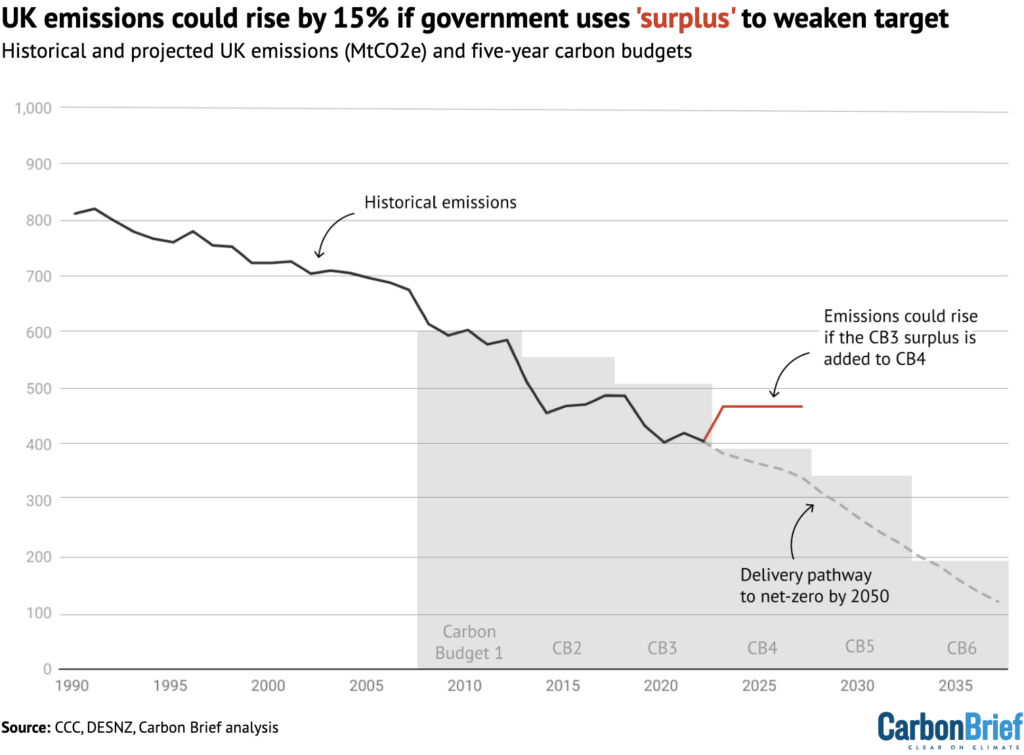DeBriefed 1 March 2024: EU’s ‘flagship’ nature law approved; Glaciers losing their climate ‘memory’; UN environment assembly resolutions – Carbon Brief
[ad_1]
Welcome to Carbon Brief’s DeBriefed.
An essential guide to the week’s key developments relating to climate change.
This is an online version of Carbon Brief’s weekly DeBriefed email newsletter. Subscribe for free here.
EU passes nature law
NATURE LAW: On Tuesday, the European parliament approved its “flagship” law to restore nature, reported Reuters, despite a backlash “ignited” by protests from farmers across Europe in recent weeks. The long-awaited “nature restoration” law commits countries to restoring nature on a fifth of their land and sea by 2030, the newswire said, and it includes specific targets such as restoring peatlands “so they can absorb CO2 emissions”. Carbon Brief published a Q&A unpacking the law and the challenges it has faced.
‘POPULISM AND FEAR-MONGERING’: The vote was subject to a “last-ditch attempt from rightwing parties” that “threatened to sink the deal”, reported the Guardian. The law – which now needs final approval from the EU council – was adopted with 329 votes in favour, 275 against and 24 abstentions, reported Deutsche Welle.
‘MANURE, BURNING TYRES AND TEARGAS’: The vote came amid a backdrop of continuing demonstrations by farmers across Europe, protesting against “the EU’s green policies, price pressures and import competition”, reported Politico. On Monday, farmers “locked down” the European quarter in Brussels and were “assaulting police barricades”, the outlet said. Elsewhere, Reuters reported that farmers “blocked a border crossing between Poland and Germany”.
UN environment assembly resolutions
TRANSITIONAL METALS: At the UN environment assembly in Nairobi, which comes to a close today, African leaders called for better controls on demands for the minerals and metals needed for a clean energy transition, the Guardian reported. A resolution supported by mainly African countries including Senegal, Burkina Faso, Cameroon and Chad would “promote equitable benefit-sharing” and attempt to avoid the “injustices” associated with fossil fuel extraction, the outlet explained. A UN press release confirmed that the resolution text was adopted.
SRM NO-GO: Also at the meeting, governments failed to agree on a resolution led by Switzerland to set up a UN expert panel on solar geoengineering, reported Climate Home News. After going through six revisions over the two-week meeting, the resolution was withdrawn on Thursday, said Reuters. The Earth Negotiations Bulletin reported earlier in the week that the resolution “was moving from the realm of the achievable”.
‘BALANCE’ WITH NATURE: At an event during the assembly, leading Islamic scholars published a “groundbreaking” document described as a “Muslim sibling” to Pope Francis’ 2015 Papal Encyclical, reported EarthBeat. The text, titled “Al-Mizan: a covenant for the Earth”, urges Islamic countries and corporations “to transition swiftly from fossil fuels” toward renewable energy in response to climate change, the outlet said.
- WINTER WORRY: A “historic” winter heatwave across the central US “demolished” temperature records and contributed to “massive wildfires” in Texas, the Washington Post reported. One of the fires is now the second-largest wildfire in US history, noted BBC News.
- ‘SERIOUS CONCERNS’: The UK’s aid spending watchdog has warned that the government will struggle to meet its commitment to spend £11.6bn over five years up to 2025-26 helping poorer countries deal with climate change, according to the Press Association.
- INDIAN INSTALLATIONS: India’s solar and wind deployment is set to increase by more than 30% in 2024, reported Bloomberg, but this pace is “still not fast enough to meet its clean energy goal of 500 gigawatts by the end of this decade”.
- US ENERGY ACCESS: The US government announced a $366m plan to fund 17 projects to expand access to renewable energy on Native American reservations and in other rural areas, said the Associated Press.
- ‘SUSPECTED SABOTAGE’: Denmark is closing its inquiry into the blasts that “tore apart” two Nord Stream gas pipelines in the Baltic Sea in 2022, BBC News reported. The investigation concluded that the pipelines had been “sabotaged”, but there was “no basis for pursuing a criminal case”.
40,000 tonnes
The amount of wood from old-growth forests in Canada burned by North Yorkshire’s Drax power station in 2023, according to a BBC News Panorama investigation. Drax responded by denying it takes wood from primary forests.
- A four-year farm trial has shown how using “enhanced weathering” in the corn belt of the US could draw down carbon dioxide and raise crop yields, reported a study in the Proceedings of the National Academy of Sciences.
- A Plos Climate study of apes across 363 sites in Africa warned that they “are and will be increasingly exposed to climate change impacts”.
- A Journal of Climate study identified a “remarkable” increase over six decades in Europe’s summer wet-bulb temperature – a “useful indicator” for heat stress.
(For more, see Carbon Brief’s in-depth daily summaries of the top climate news stories on Monday, Tuesday, Wednesday, Thursday and Friday.)
This week, the Climate Change Committee (CCC) – the UK’s official advisor – issued “unequivocal” advice to the government that the “surplus” from previous carbon budgets should not be carried forward, reported Carbon Brief. The UK overachieved on its carbon budget for 2018-22, leaving it with an emissions “surplus” – but this was largely down to external factors such as the Covid-19 pandemic rather than policies, the CCC said. It warned that carrying the emissions surplus over could allow the UK’s emissions to rise by 15% (red line on the chart) during the fourth carbon budget period of 2023-27.
Guest post: The climate ‘memory loss’ of melting glaciers

Dr Andrea Spolaor from the Institute of Polar Sciences of the National Research Council of Italy, explains how rapidly melting glaciers are washing away crucial evidence of the world’s past climates.
Ice cores, extracted from glaciers and polar ice sheets, hold vital clues to Earth’s climate history.
These cylindrical samples provide a timeline of past temperatures and ancient atmospheres. Analysing the chemical composition, gas concentrations and other markers within the ice layers enables scientists to uncover how Earth and its climate has changed over millions of years.
As a result, ice cores are essential for understanding natural climate variability and human-induced changes, as well as helping predict future trends. They contribute crucial data to climate models and efforts to address climate change.
However, as the world warms, glaciers are retreating at an unprecedented pace, leading to the loss of the crucial information they hold.
In a recent study, published in the Cryosphere, my colleagues and I found that this memory loss extends to the glaciers of the Svalbard archipelago, located in the Arctic Circle.
Our study investigated the impact of rising temperatures on the “signal” of a changing climate contained within the glaciers of the Holtedahlfonna ice field.
The direct consequence of warming has been an increase in summer melt and more meltwater percolating through the ice. This meltwater can wash chemical constituents throughout the layers of ice, potentially disrupting the climate signal they preserve. Eventually, this can compromise the complete preservation of climatic information within the ice cores.
Our study revealed a worrying trend – the climate signal stored in the ice had deteriorated. In just seven years, the markers that allowed us to separate out the different seasons in a core extracted in 2012 had completely vanished in a core from 2019.
Despite the loss of the seasonal signal, the overall imprint of atmospheric warming still persists in the ice. This suggests that the site remains suitable for reconstructing past climates over an extended period. However, with the current pace of warming in the Svalbard archipelago, Holtedahlfonna and other ice fields at similar altitudes may not provide reliable records of past climatic conditions for much longer.
The Svalbard archipelago is particularly sensitive to climate changes due to the relatively low altitude of its main ice caps and the rapid warming of the Arctic region. Nonetheless, similar losses have also been observed in other parts of the world.
To preserve these archives, researchers involved in the Ice Memory and Sentinel projects concluded a complex ice drilling campaign in 2023 on the Holthedalfonna glacier, successfully extracting three deep ice cores. We hope that these samples still contain climatic information representative of the region.
Our research has emphasised the need to preserve these glacial archives and the crucial climatic insights they contain.
ENVOYS WILL BE ENVOYS: The Diplomat profiled the new climate envoys for the US and China and what the reshuffle means for climate engagement between the two countries.
CLEANEST, CHEAPEST OR FAIREST?: Climate Home News explored the tricky question of “who should get to drill, pump and sell” the world’s final supplies of oil and gas.
‘THE OTHER IRA’: A BBC Radio 4 programme looked at how the US Inflation Reduction Act will impact global trade and the economy – and the prospects for a similar bill in the UK.
- UN Environment Programme, regional sub-programme coordinator (climate action) | Salary: Unknown. Location: Nairobi, Kenya
- ODI, research officer and senior research officer (climate and sustainability) | Salary: £31,000-39,000 and £37,000-47,000, respectively. Location: London (hybrid)
- Climate & Development Knowledge Network, gender and social inclusion lead | Salary: Unknown. Location: Cape Town, South Africa
- Church of England, net-zero carbon programme officer | Salary: £46,577. Location: Home-based (with regular meetings in London)
DeBriefed is edited by Daisy Dunne. Please send any tips or feedback to [email protected]
Sharelines from this story
[ad_2]


